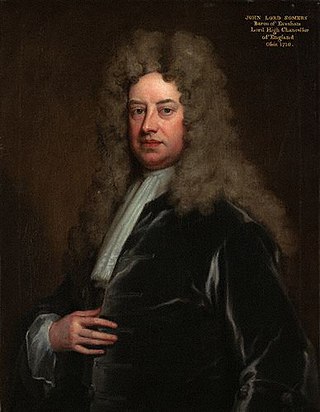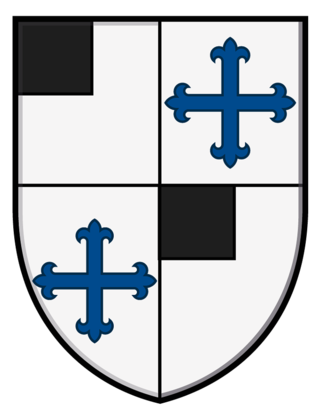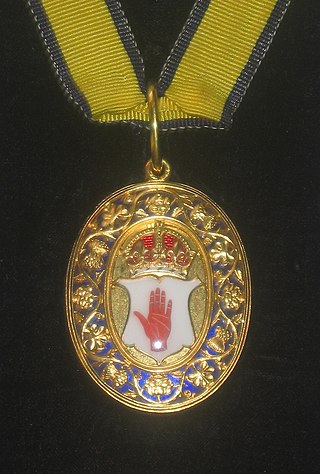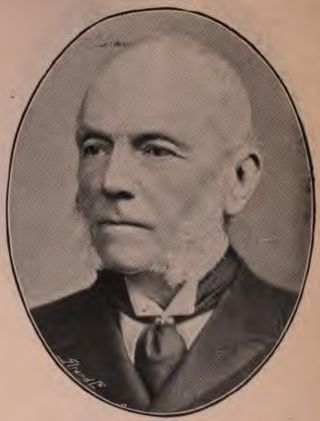Related Research Articles

Baron Somers, of Evesham in the County of Worcester, is a title that has been created twice. The title was first created in the Peerage of England in 1697 for Sir John Somers, so that he could sit in the House of Lords and serve as Lord Chancellor. The title became extinct on Lord Somers' death in 1716. His sister and co-heiress, Mary Somers, married Charles Cocks, a member of a prominent Worcestershire family. Their grandson Charles Cocks represented Reigate in Parliament from 1747 to 1784, and was created a baronet, of Dumbleton in the County of Gloucester, in the Baronetage of Great Britain in 1772. In 1784 the barony held by his great-uncle was revived when he was made Baron Somers, of Evesham in the County of Worcester, in the Peerage of Great Britain.

The HaringtonBaronetcy, of Ridlington in the county of Rutland, is a title in the Baronetage of England. It was created on 29 June 1611 for James Harington. He was a descendant of John Harington, one of the Barons summoned to Parliament by Edward II. James's elder brother was John Harington, 1st Baron Harington of Exton. The second Baronet was a Royalist during the English Civil War. The third Baronet was a Major-General in the Parliamentarian Army and one of the judges appointed to try Charles I, although he refused to sit. He was nonetheless excepted from the Indemnity and Oblivion Act and his title was forfeited for life in 1661. The ninth and twelfth Baronets were both judges.
Jacob Bouverie, 1st Viscount Folkestone was an English politician, known as Sir Jacob Bouverie, 3rd Baronet from 1737 to 1747.
There have been a number of creations of baronets with the surname Smith.

There have been two baronetcies created for persons with the surname Rushout, one in the Baronetage of England and one in the Baronetage of the United Kingdom. Both creations are extinct.
There have been six baronetcies created for persons with the surname Brooke, one in the Baronetage of England, one in the Baronetage of Ireland and four in the Baronetage of the United Kingdom. As of 2015 four of the creations are extant, though one has been subsumed into a peerage.
There have been two baronetcies created for persons with the surname Cave, one in the Baronetage of England and one in the Baronetage of the United Kingdom. Both creations are extant as of 2008.
Charles Cocks, 1st Baron Somers, known as Sir Charles Cocks, 1st Baronet, from 1772 to 1784, was a British politician who sat in the House of Commons from 1747 to 1784.
There have been four baronetcies created for persons with the surname Rich, two in the Baronetage of England, one in the Baronetage of Great Britain and one in the Baronetage of the United Kingdom. As of 2008 three of the creations are extinct while one is dormant.

Sir John Hoskyns, 2nd Baronet PRS was an English baronet.
There have been three baronetcies created for people with the surname Riddell, one in the Baronetage of Nova Scotia, one in the Baronetage of Great Britain and one in the Baronetage of the United Kingdom. As of 2014 one creation is extant.

There have been four baronetcies created for persons with the surname Sutton, one in the Baronetage of Great Britain and three in the Baronetage of the United Kingdom. One creation is extant as of 2021.
There have been seven baronetcies created for persons with the surname Sinclair, six in the Baronetage of Nova Scotia and one in the Baronetage of Great Britain. Four of the creations are extant as of 2008.

The Barrow, later Crawley-Boevey Baronetcy, of Highgrove in the County of Gloucester, is a title in the Baronetage of Great Britain. It was created on 22 January 1784 for Charles Barrow, Member of Parliament for Gloucester, with remainder to Thomas Crawley-Boevey, who succeeded as second Baronet. Crawley-Boevey was husband of Ann, granddaughter of Thomas Barrow, brother of the first Baronet. His grandfather Thomas Crawley had on inheriting Flaxley Abbey in 1726 assumed the additional surname of Boevey. Flaxley Abbey had been purchased in 1648 by the merchant, lawyer and philosopher James Boevey (1622–1696) and his half-brother William Boevey. The second Baronet was succeeded by his eldest son, the third Baronet. He was High Sheriff of Gloucestershire from 1831 to 1832. His grandson, the fifth Baronet, was High Sheriff of Gloucestershire in 1882.

There have been four baronetcies created for members of the ancient House of Beaumont, all in the Baronetage of England. All four creations are extinct or dormant.
The Fust Baronetcy, of Hill in the County of Gloucester, was a title in the Baronetage of England. It was created on 21 August 1662 for Edward Fust, who had earlier fought as a Royalist in the Civil War. The title became extinct on the death of the sixth Baronet in 1779.

There have been five baronetcies created for persons with the surname Morgan, two in the Baronetage of England, one in the Baronetage of Great Britain and two in the Baronetage of the United Kingdom. All five creations are extinct.

There have been two baronetcies created for members of the Sandys family, both in the Baronetage of England. Both creations are extinct.
Robert Tracy (1655–1735) was an English judge.
Sir Richard Cocks, 2nd baronet (c.1659-1726), of Dumbleton, Gloucestershire, was an English politician.
References
- 1 2 3 4 Rudder, Samuel (1779). A New History of Gloucestershire (2006 facsimile ed.). pp. 420–1.
- 1 2 Frith, Brian (1990). Bigland's Gloucestershire Collections. pp. 520–1.
- ↑ "'Chocke-Colepeper', in Alumni Oxonienses 1500-1714". British History online. Retrieved 2 February 2022.
- ↑ Collins, Arthur (1741). The English Baronetage. p. 360.